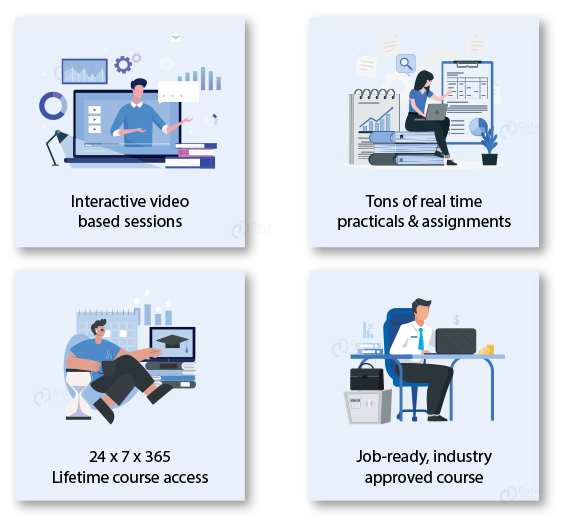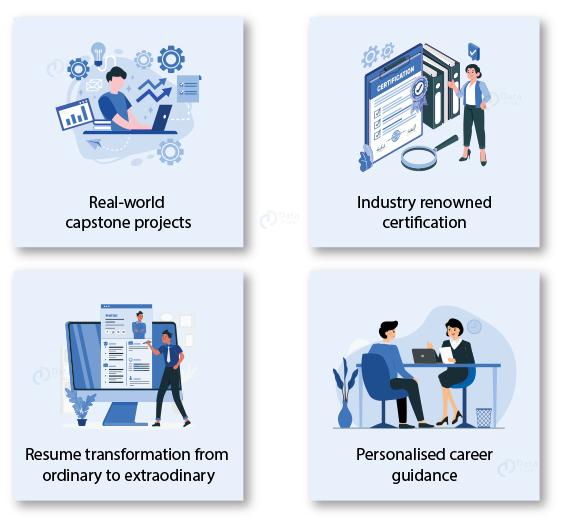Free PySpark Certification Course
 Welcome to this brand new course on PySpark, by DataFlair. This course has been designed to equip you with the essential skills and knowledge needed to master PySpark. Get ready to begin your PySpark learning journey as we take you through all the important concepts in PySpark.
Welcome to this brand new course on PySpark, by DataFlair. This course has been designed to equip you with the essential skills and knowledge needed to master PySpark. Get ready to begin your PySpark learning journey as we take you through all the important concepts in PySpark.
What will you take home from this Free PySpark Course?
- Self-paced video course
- 170+ hrs of study material, practicals, quizzes
- Acquire practical knowledge which industry needs
- Practical PySpark course with real-time case-studies
- Lifetime access with industry renowned certification
Why should you enroll in this Free PySpark course?
- Learn best practices for data analysis and preprocessing in PySpark
- Gain relevant skills which will help you advance in your professional career
- Learn how to integrate PySpark with Python programming language to make the best use of PySpark
- Gain skills that are in high demand in the industry
- Upgrade your current skill set by learning PySpark
- Enhance your data analysis and data preprocessing skills
- On successful completion of the course, you will receive a career-boosting certificate
- Get access to projects and tests which will put your PySpark skills to the ultimate test
- Master the Python library which is widely used in Big Data Analytics projects
- Learn to build scalable Machine Learning models using PySpark to solve real-world problems
- Get guidance and mentorship from professionals
- Make full use of this self paced course by learning at your own speed and comfort
- Learn how to explore and interact with your data in real time
- Get access to a diverse curriculum developed by experts
PySpark Course Objectives
Welcome to this in-depth PySpark course by DataFlair. This PySpark course will take you through all the important PySpark concepts which are highly in-demand in the industry. This PySpark course has been designed and developed by experts who are having a great experience in the same field. It does not matter whether you are a beginner or if you have some prior experience in coding. This PySpark course will definitely help you in gaining proficiency in PySpark.
In this PySpark course, you will dive deep into the world of PySpark. This PySpark course starts off by teaching the fundamental concepts of PySpark like, DataFrame API, Distributed Computing etc. Moving forward, you will be taught several advanced concepts like handling Big Data using PySpark, Spark SQL Optimization, Machine Learning with MLlib, Integration with External Libraries etc.
We strongly believe that a course which consists of just theory will definitely fail to capture your attention for a long period of time. In order to avoid this, we have included some assignments, tests and projects in this PySpark course. These assignments, tests and projects will put your PySpark skills to the test and also improve your problem solving ability.
The main objective of this PySpark course is to equip you with comprehensive knowledge and skills which are very much in-need to handle Big Data processing and analysis. This PySpark course can be taken by anyone who wishes to either progress in their professional career or improve their current skill-set by learning a new skill.
During this PySpark course, you will have guidance and mentorship from professionals and mentos who are experts in PySpark. At any point, if you feel that you’re stuck or you need any kind of help, you can reach out to them for assistance and they will be more than happy to help you out. We understand that learning is a dynamic process and hence, we are committed to ensure that you don’t face any difficulties during your learning process. Our mentors and instructors are fully dedicated to ensure that you will succeed in this course.
By the end of this PySpark course, you will also gain a course completion certificate from DataFlair. This certificate will serve as a testament to your hard work, dedication and the skills which you would have acquired from the course. This certificate will hold a great value in your resume and it will also help you in making progress in your professional career. Apart from this, you will have lifetime access to the course materials. If at any point further, you wish to revisit the course materials to brush up your concepts, just head back to our website, login to your account and you can have a look at the course material.
Why should you learn PySpark?
- It is one of the most widely used Python library in many organizations to deal with massive volumes of data that require distributed processing
- PySpark is widely used in industries like finance, healthcare, e-commerce etc
- Analyzing and processing large datasets becomes extremely easy due to PySpark’s distributed computing model
- PySpark also provides tool which help in data analysis, transformation and visualization
- PySpark developers are very well paid. The average salary of a PySpark developer in India is Rs 7 lakh per annum
What is PySpark?
PySpark is an open-source distributed computing framework which is widely used for processing and analyzing huge datasets. It is built on top of Apache Spark, a fast and general purpose data processing engine. People who have some experience in Python, usually find it easy to perform operations in PySpark, since it allows users to write data processing tasks in Python.
One of the most important features of PySpark is its ability to perform distributed data processing, which enables it to handle large datasets efficiently across a cluster of computers. This feature of PySpark makes it well suited for Big Data Applications. Using PySpark, users can work with various data sources like Hadoop Distributed File System, Apache Hive and many more. Spark’s DataFrame API and Spark SQL help its users in exploring and analyzing large structured datasets.
Over the past few years PySpark has gained a lot of popularity in the industry. It is mainly because of its scalability and ease of use. Spark’s scalability feature allows users to handle data processing tasks at ease. It achieves all this by distributing data across a cluster of machines and performing parallel computations. As a result of all these user-friendly features PySpark has become the preferred choice for Big Data processing and analytics. The main idea behind this is to promote collaborative learning, knowledge sharing and the ability to share insights across teams or organizations.
What to do before you begin?
It is often seen that, individuals with a moderate level of understanding in Python, find PySpark to be very easy. Python allows you to write code in PySpark with similar syntax and concepts, thus making the learning curve less steep. Hence, it is advisable to go through fundamental concepts in Python, before getting started with PySpark.
In addition, since PySpark is widely used to handle, process and analyze big data it is recommended to have some understanding regarding the working of distributed systems and other related concepts like parallel processing, data partitioning and fault tolerance. Furthermore, familiarity with big data concepts like Hadoop, Distributed file systems and data processing frameworks will help you in the later part of the course, where we will be teaching you some advanced concepts in PySpark.
Furthermore, having some understanding of SQL will help you get used to PySpark even faster since PySpark provides you with a SQL-like interface, using which you can easily query and manipulate structured data. It is advisable to know about concepts like querying, joining tables, performing aggregations, etc.
Who should go for this free PySpark course?
If you are someone who is passionate about working with data and have a strong desire to work with Big Data and perform distributed data processing, then this PySpark course is a must for you. PySpark will provide you with all these skills required to handle huge datasets efficiently and develop scalable data processing pipelines. Furthermore, Data Analysts who want to expand their data manipulation and analysis on Big Data, should definitely consider this PySpark course. You will learn how to use the PySpark DataFrame API to explore and analyze datasets as well as gain various insights from the data. PySpark is widely used in various domains like healthcare, finance, marketing etc. Data professionals from all these industries can make use of this course to gain relevant skills in PySpark. Professionals from these domains can make use of Spark’s streaming and structured streaming features to work with real-time data and build real-time analytics applications.- Individuals who are looking to upskill themselves by learning PySpark.
- Professionals who wish to make use of PySpark concepts to handle and analyze Big Data.
- Data Analysts who aim at progressing in their professional life by improving their data analysis and data manipulation skills using PySpark
- If you are passionate about working with real-time data and wish to build applications which can perform real-time analytics, this course is a must for you.
- Software Engineers who are interested in distributed computing and building scalable data processing applications can enroll in this PySpark course
By enrolling in our PySpark course, you can expect the following benefits:
Enrolling in this course has several benefits like:This PySpark course includes a mixture of assignments, tests and projects which makes it a complete hands-on session. This PySpark course will provide you with the ultimate practical skills which can be applied to solve complex real world problems. Hands-on experience will also improve your problem solving ability and your understanding in the subject. You will also understand how to make use of Spark’s distributed computing concepts to process and analyze large datasets effectively.
This PySpark course will also teach you how to integrate PySpark with other Big Data technologies like Hadoop Distributed File Systems (HDFS), Spark SQL etc. These features will prove to be of great help to Big Data professionals to build end-to-end data processing workflows. The course will teach you to tackle Big Data challenges effectively.
On completing this PySpark course, you will receive a course completion certificate. This certificate will hold a great value in your resume and it can also validate your proficiency in PySpark. Furthermore, you will have lifetime access to the course material thus enabling you to revisit the course at any point in the future.
Participants will also learn in this PySpark courseThis PySpark course is designed to teach you all the important concepts in PySpark, starting from basics, all the way till advanced concepts. You will learn how to harness the power of distributed computing to efficiently process and analyze large-scale datasets. Participants will delve into PySpark’s DataFrame API, gaining expertise in data manipulation, exploration, and visualization, enabling them to derive valuable insights from diverse data sources.
Moving forward in this PySpark course, you will be taught about Spark’s popular Machine Learning library MLlib. Using this library you can design, train and deploy Machine Learning models at a large scale. Throughout this PySpark course, the assignments, tests and projects will reinforce your understanding and problem solving abilities, thus ensuring that you can confidently apply your PySpark skills wherever required.
Furthermore, you will also be taught how to perform real-time data processing using Spark’s streaming capabilities. You will also gain expertise in integrating Spark with various Big Data Technologies like Hadoop, Spark SQL thus enabling you to build end-to-end data processing workflows.
- Fundamentals of PySpark like DataFrame API, data processing and analysis with PySpark
- Building scalable data processing applications in distributed environments
- Developing real-time analytics solutions with Spark’s streaming features
- Using Spark’s MLlib library to design, train and deploying scalable Machine Learning models
- Applying PySpark’s NLP concepts for text analysis and implementing natural language processing
Jobs after Learning this PySpark Course
The main objective of this PySpark course is to educate you about the various important concepts in PySpark. There are many exciting jobs which you can apply to, once you are proficient in PySpark. Some of them are Data Engineer, Data Analyst, Data Scientist, Big Data Developer etc.
A Data Engineer uses PySpark to design, build and maintain data pipelines, data infrastructures. PySpark also allows Data Engineers to process and analyze huge datasets efficiently. Compared to the traditional single node processing techniques PySpark can also handle processing of tasks in a much more efficient and faster way.
Data Scientists also use PySpark for various purposes like Big Data Processing, Data Exploration and Preprocessing, Machine Learning, Real Time Data Analysis etc. Spark’s distributed computing concepts allow Data Scientists to work with huge datasets easier.
The DataFrame API in PySpark makes the process of exploring and manipulating structured data quite simple. Along with all this, PySpark also provides Data Scientists with a library called MLlib which has its own scalable implementation of common Machine Learning algorithms. Data Scientists can use these algorithms to build Machine Learning models which can be used for real-world applications.
- Big Data Developer: The amount of data which is being generated every day is increasing at an alarming rate. A Big Data Developer plays an important role in handling and analyzing such large volumes of data, in order to extract insights from it and eventually take data driven decisions. Big Data Developers use Spark to design, develop and implement scalable solutions, which ensures that the performance of the applications is not affected while handling large volumes of data.
- Machine Learning Engineer: Machine Learning Engineers are professionals whose main job is designing, building and deploying Machine Learning models at a large scale. They can make use of PySpark’s MLlib library to tackle complex Machine Learning projects and work on a wide range of applications which includes advanced analytics, natural language processing, computer vision etc.
Our students are working in leading organizations

Online PySpark Free Training Course Curriculum
- Introduction to PySpark
- Setting up PySpark
- Introduction to Spark DataFrames
- Spark DataFrame Basics
- Spark DataFrame Basics Part Two
- Spark DataFrame Basic Operations
- Groupby and Aggregate Operations
- Missing Data
- Dates and Timestamps
- Introduction to Machine Learning and ISLR
- Machine Learning with Spark and Python with MLlib
- Linear Regression Theory
- Documentation
- Regression Evaluation
- Linear Regression Example
- Linear Regression Project
- Logistic Regression Theory
- Logistic Regression Example
- Logistic Regression Project
- Tree Methods Theory
- Tree Methods Documentation
- Decision Trees and Random Forest Code
- Random Forest Classification Project
- K-means Clustering Theory
- KMeans Clustering Documentation
- Clustering Example
- Clustering Project
- Introduction to Recommender Systems
- Recommender System Project
- Introduction to Natural Language Processing
- NLP Tools-1
- NLP Tools-2
- Natural Language Processing Project
- Introduction to Streaming with Spark
- Spark Streaming Example
- Spark Streaming Project
Features of PySpark Free Course


